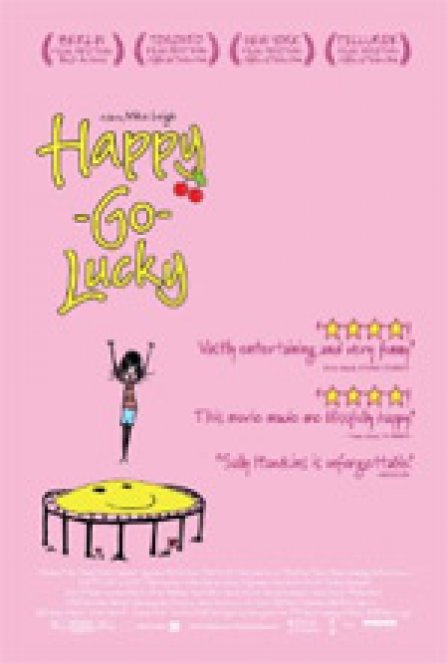When we first meet Poppy (Sally Hawkins), the irrepressible heroine of Happy-Go-Lucky, she seems equal parts adorable and maddening. She finds nice things to say about everyone she meets. She rarely answers a question without cracking a joke. She bounces on trampolines in her spare time. In the movie’s first scene, Poppy persists in trying to spark up a conversation with a bookstore clerk who tunes her out; many of us might be inclined to sympathize with the clerk.
Not surprisingly given its pedigree (it’s the latest from renowned British filmmaker Mike Leigh, whose films have generally been critical darlings), Happy-Go-Lucky is both smarter and more complicated than its Miramax marketing – the pink posters, the “This fall, get happy” tagline – would have you believe. The film is something of a departure from the director’s more somber fare, but the chipper Poppy is not so dissimilar to Vera Drake, Leigh’s most recent heroine, who maintained a buoyant façade while performing illegal abortions. Poppy’s perkiness, made vivid by the excellent Hawkins, is so disarming – and relentless -- that we’re sure she must be masking deeper neuroses. She can’t stand still, craning her head and fidgeting while her Spanish dancing instructor lectures her class about the solemnity and passion of flamenco. She shrieks with laughter during a painful examination of her injured back. Her cheer seems like a nervous tic.
But Poppy is made of sterner stuff than she first shows us. She acquires a grouchy foil in the form of Scott (Eddie Marsan), the surly driving teacher she employs after her bike is stolen (an event she laughs off). Scott, who simmers with barely-contained rage, can’t abide Poppy’s unflagging optimism; his mantra for driving and for life might be the advice he gives Poppy when teaching her to merge: “Expect the juggernaut.” Their friction culminates in the movie’s dramatic apogee, in which both characters reveal surprising sides of themselves.
Character-driven in the best sense, Happy-Go-Lucky offers no grand revelations or overarching plot strands. Leigh stuffs the film with unusually lifelike movie moments: Poppy preparing an art project for her class the next day, a group of friends recuperating the morning after a night spent clubbing. The characters’ lives don’t change all that much over the course of the movie; when Poppy begins dating a hunky social worker late in the film, we’re happy for her without being relieved. She’s the rare movie protagonist that doesn’t need someone, or something, to save her.
Leigh conceived the film with Hawkins in mind (she also appears in the director’s All or Nothing and Vera Drake), and she inhabits her tricky role with nuanced exuberance. Her vibrant Poppy is like The Office’s David Brent (Ricky Gervais) without the desperation. And if Hawkins is the movie’s life force, Marsan is its linchpin, investing Scott’s tirades with both pain and comic brio. With several stage veterans and first-time film actors in the cast, every supporting character, no matter how minor, is rounded and intriguing, likely owing to Leigh’s famous process of improvising the characters with his performers while writing the script.
Happy-Go-Lucky may seem like rough going at first, with the sunny, always-smiling Poppy threatening to grate. But, somehow, she gets to you in the best way: her major challenges become fascinating, her minor triumphs thrilling.

